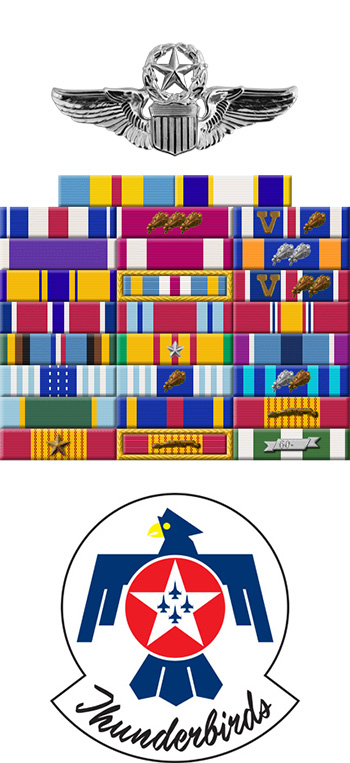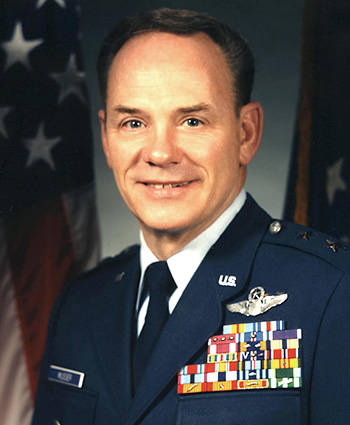
|
Stanton R. Musser |
 |
|||
| Rank, Service | ||||
Major General O-8, U.S. Air Force |
||||
| Veteran of: | ||||
|
||||
| Tribute: | ||||
Stan Musser was born on April 2, 1936, in Lewisburg, Pennsylvania. He was commissioned a 2d Lt in the U.S. Air Force through the Air Force ROTC program at Gettysburg College in Gettysburg, Pennsylvania, on June 8, 1958, and went on active duty beginning July 17, 1958. Lt Musser next completed pilot training and was awarded his pilot wings at Laredo AFB, Texas, in September 1959, followed by F-100 Super Sabre Combat Crew Training from September 1959 to July 1960. His first assignment was as an F-100 pilot with the 417th Tactical Fighter Squadron of the 50th Tactical Fighter Wing at Ramstein AB, West Germany, from September 1960 to June 1964, and then as an F-100 pilot with the 31st Tactical Fighter Wing at Homestead AFB, Florida, from July 1964 to April 1966. During this time, Capt Musser flew 177 combat missions in Southeast Asia as an O-1 Bird Dog forward air controller from September 1964 to January 1965. His next assignment was as an Air Officer Commanding in the Corps of Cadets at the U.S. Air Force Academy from May to December 1966, followed by service as an F-100 and then F-4 Phantom II pilot with the U.S. Air Force Aerial Demonstration Squadron, the Thunderbirds, at Nellis AFB, Nevada, from December 1966 to May 1970. Lt Col Musser served as an F-4E pilot and Assistant Operations Officer with the 469th Tactical Fighter Squadron at Korat Royal Thai AFB, Thailand, from May to September 1970, and then as Assistant Deputy Commander for Operations of the 388th Tactical Fighter Wing at Korat from September to December 1970. During this time he flew another 86 combat missions. His next assignment was as an Air Operations Staff Officer and then as Chief of the Tactics Branch with Headquarters U.S. Air Force in the Pentagon from January 1971 to August 1973, followed by attending the Industrial College of the Armed Forces at Fort McNair, Washington, D.C., from August 1973 to July 1974. Col Musser served as Assistant Deputy Commander for Operations of the 4th Tactical Fighter Wing at Seymour Johnson AFB, North Carolina, from July 1974 to July 1975, and then as Deputy Commander of the Cadet Wing and then as Vice Commandant of Cadets at the U.S. Air Force Academy from July 1975 to October 1977. His next assignment was as Vice Commander of the 1st Tactical Fighter Wing at Langley AFB, Virginia, from October 1977 to August 1979, followed by service as Commander of the 602nd Tactical Air Control Wing at Bergstrom AFB, Texas, from August 1979 to April 1980. Gen Musser served as Commander of the 33rd Tactical Fighter Wing at Eglin AFB, Florida, from April 1980 to February 1982, and then as Vice Commander of the Ogden Air Logistics Center at Hill AFB, Utah, from February 1982 to July 1983. His next assignment was as Chief of the Office of Military Cooperation in Cairo, Egypt, from July 1983 to July 1985, and then as Assistant Deputy Chief of Staff for Logistics and Engineering at Headquarters U.S. Air Force in the Pentagon from July 1985 to July 1986. Gen Musser served as Deputy Director of the Defense Logistics Agency at Cameron Station, Virginia, from July 1986 to September 1987, and then as Commander of the Air Force Inspection and Safety Center at Norton AFB, California, from September 1987 until his retirement from the Air Force on September 1, 1989. Stan Musser died on October 8, 2012, and was buried at Arlington National Cemetery. |
||||
|
||||

